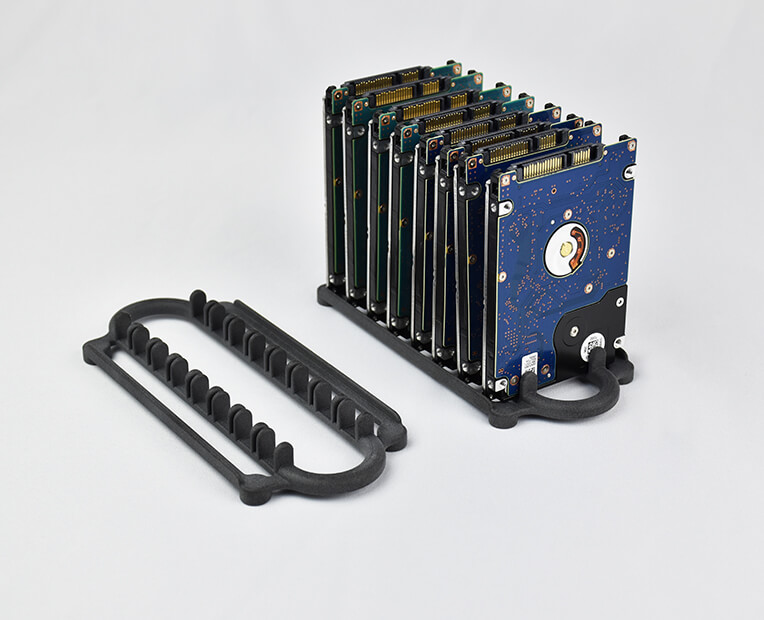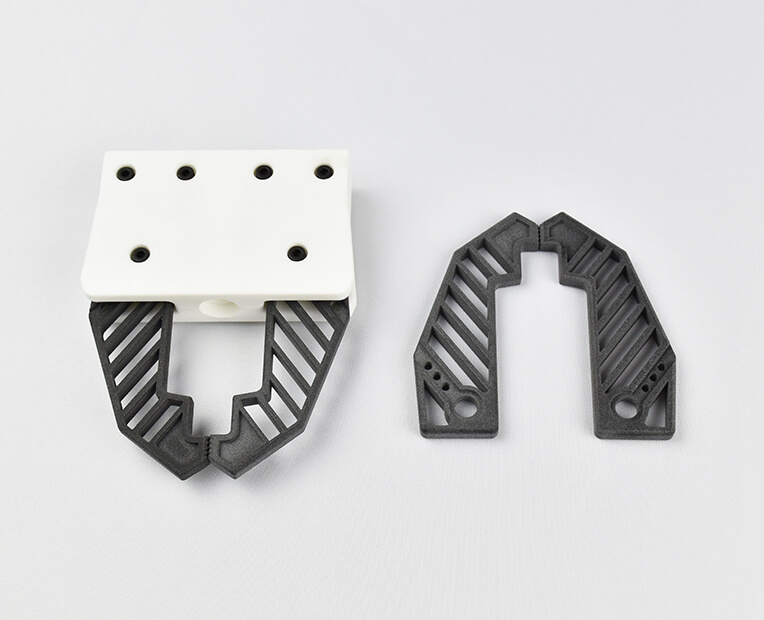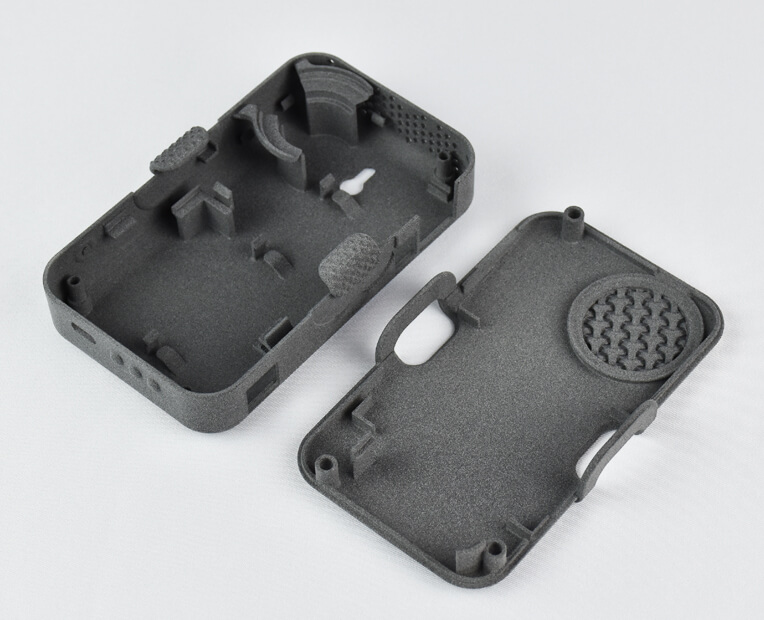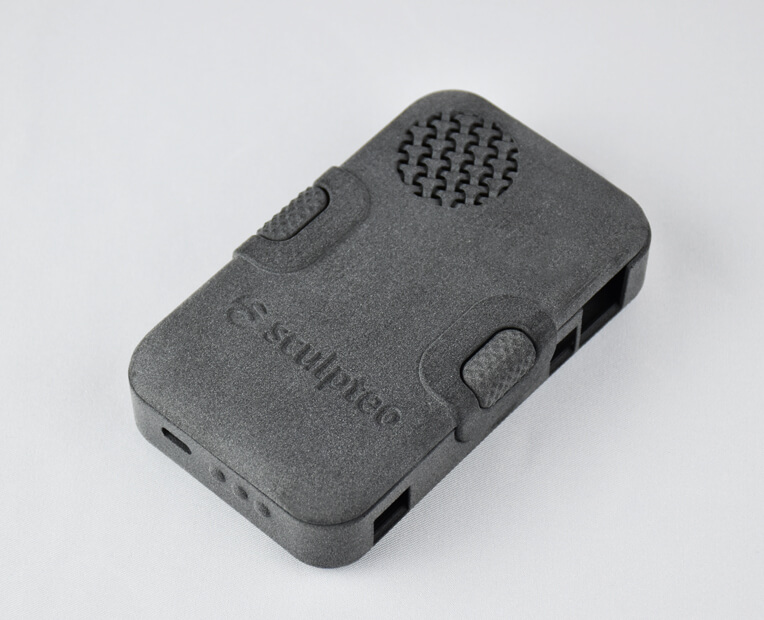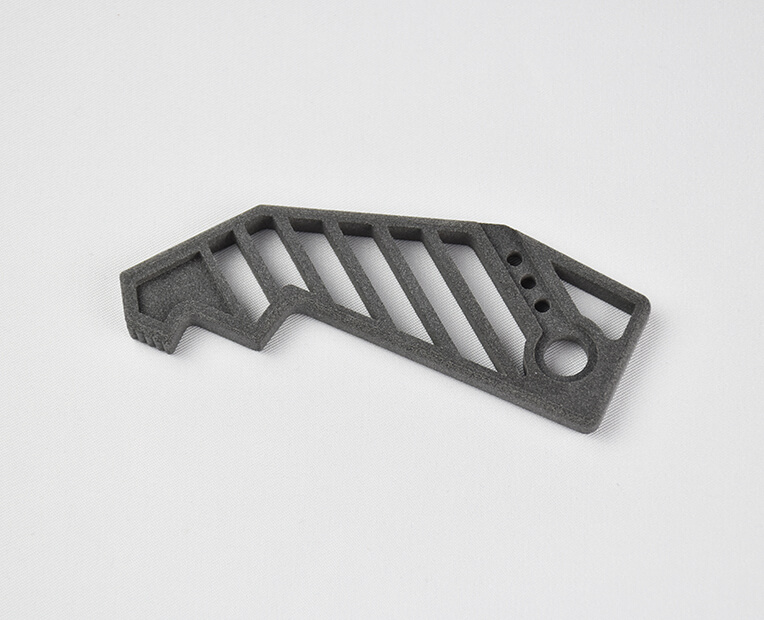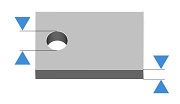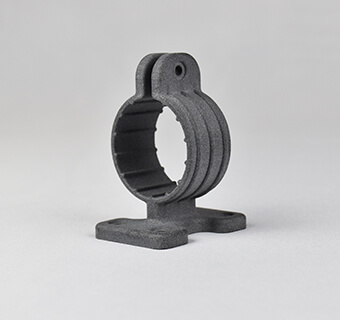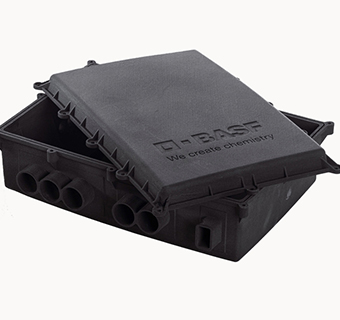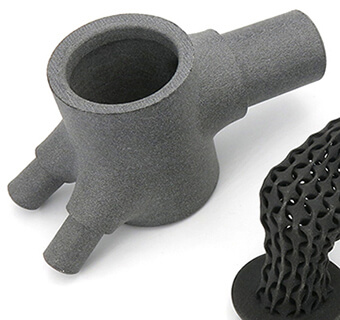Home » 3D Printing Materials » SLS technology » Ultrasint® PA11 ESD
Ultrasint® PA11 ESD
3D printing material
Ultrasint® PA11 ESD is a resistant 3D printing material with electrostatic discharging properties. Discover the benefits and applications of this bio-derived material.
Ultrasint® PA11 ESD Material Guide
What is Ultrasint® PA11 ESD?
Ultrasint® PA11 ESD is a bio-derived powder material with electrostatic discharging properties for increased process safety in advanced applications. With its interesting mechanical properties, this material offers new possibilities for a wide range of new applications, especially for the electronics sector.
Your parts will be 3D printed using sustainable powder, derived from castor oil. Parts 3D printed with Ultrasint® PA11 ESD discharge all unwanted electrostatic charges from sensitive components and systems, it also reduces the risk of electrostatically induced failures and damages. If you are prototyping or producing a project where electrostatic discharging safety is critical, this PA11 material will be the perfect choice.
Ultrasint® PA11 ESD is printed using Selective Laser Sintering. Please keep in mind that you will have to respect specific design guidelines to avoid any problem during the additive manufacturing process. Be sure to check the material design guidelines while creating your 3D file and before you send it for 3D printing.
What are the possible applications for this material?
Thanks to this PA 11 material, you can easily manufacture your ESD-safe prototypes and end-use parts. Indeed, the surface resistivity of Ultrasint® PA11 ESD is lower than traditional electrostatic dissipating materials.
| Electrical properties | Test Method | Typical Values (X-direction) | Typical Values(Z-direction) |
|---|---|---|---|
Specific volume resistivity / Ω⋅m|
IEC 62631-3-1 | 2.3 - 106 | 2.1 - 104 | |
| Specific volume resistivity / Ω | IEC 62631-3-2 | 1.3 - 104 | 3.4 - 104 |
This material also presents great mechanical and thermal characteristics.
Electronic Housing
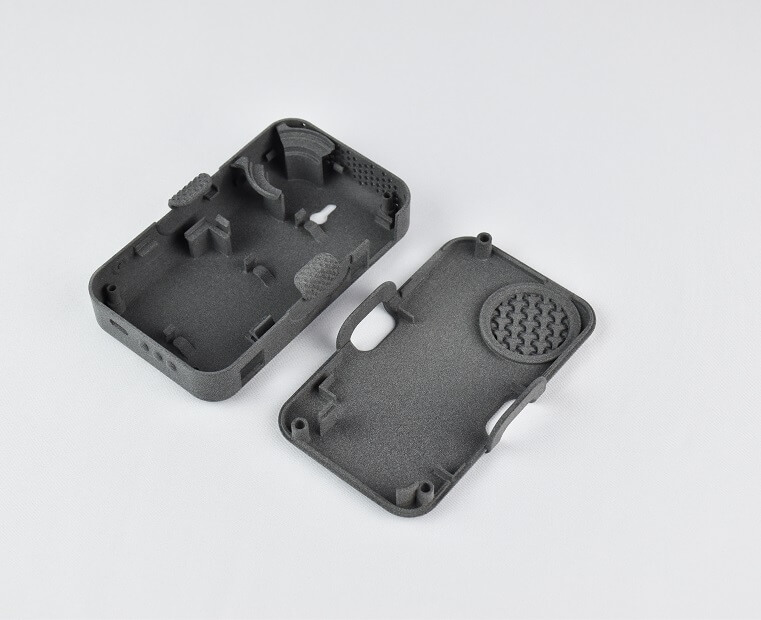
Ultrasint® PA11 ESD allows you to handle your electronic components with a higher level of safety, as the material does not accumulate static electricity and can come in contact with electronic components without running the risk of damaging them.
- Jigs and fixture for electronics
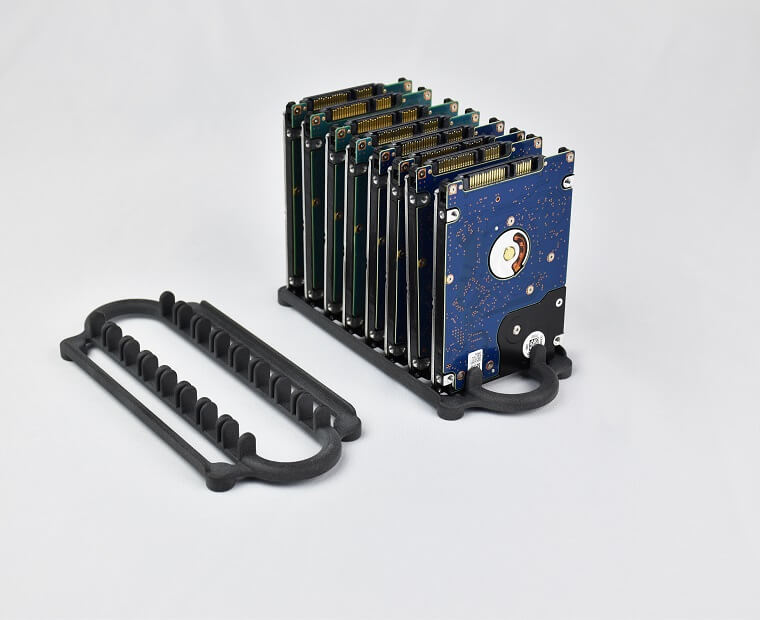
Ultrasint® PA11 ESD is the optimal material for the rapid construction of durable jigs and fixtures for the electronics industry.
- Tooling
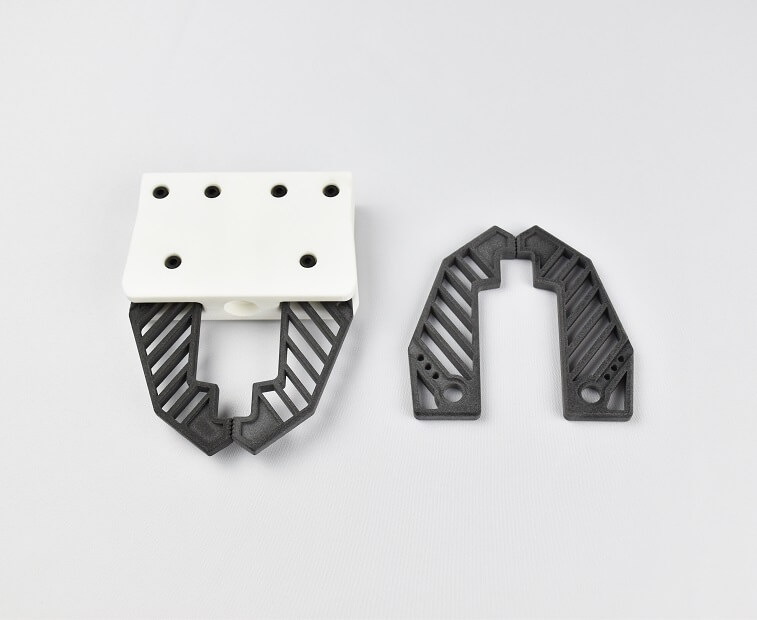
Start to optimize your tooling process and the creation of machine parts by using 3D printing. Ultrasint® PA11 ESD has some interesting mechanical properties such as high tensile strength and elasticity, which could help you create efficient tools.
Pricing
The printing price of your design is calculated automatically the moment it is uploaded. As you modify your object (changing material, finishing, size, using our hollowing feature, etc.) you will note that the price changes automatically. The pricing is based on a series of factors, including total volume, object size, and bounding box – to name a few.
The estimated shipping time is also calculated automatically as the object is uploaded and each time you make a modification on it. Delivery time should be added to processing time.
For more information, check our pricing page.
How does Selective Laser Sintering work?
Sculpteo uses a layer by layer process called Selective Laser Sintering (SLS) to manufacture Ultrasint® PA11 ESD parts.
The Selective Laser Sintering technology uses a highly specific laser that sinters thin layers of powder together one layer at a time. After each round of lasering, the printing bed is lowered and another layer of powder is evenly swept across the top for another round of sintering. This 3D printing process continues until the part is fully printed according to the 3D file.
Maximum size | 150x 200x 250 mm |

The maximum size of your models are limited by the physical size of our 3D printers – nothing can be printed larger than the printer bed. |
Due to the printing process, your objects will have upskin and downskin. Upskin is a little concave, whereas downskin will show slight convex. Upskin will appear on the top of your object, downskin at the bottom. This is important to consider when you set the orientation of your 3D model. If the upskin and downskin will affect your design, set the orientation beforehand and we will honor it, if you are not sure, our technicians will choose the best one. |
| Standard layer thickness | 100µm |
| Accuracy | ± 0.4% (minimum of ± 0.4 mm) |

| Minimum wall thickness | 0.7mm |

| Stemmed elements with support | 0.7mm |
| Stemmed elements without support | 1mm |

Minimum height and width details | Embossed : 0.5 mm
|
| Ratio Depth / width | 1/1
|
| Enclosed parts ? | Yes |
| Interlocking parts ? | Yes |

Our material has the ability to print the most complex designs of our materials . An example of a complex design is a volume enclosed within another volume, like a chain or a ball joint connection. Our printers have the ability to print a fully interlocked chain, with no support structures to remove. |
| Minimum spacing between fixed walls | 0.5 mm |
| Minimum clearance between parts | 0.5 mm |

For a successful 3D print a minimum clearance between objects is required to allow excess material to be sand blown out. If this space is not left within the design, the object will be a solid. This is particularly important for articulated objects – as the space left between the walls will define the object’s ability to move.
Clearance should be at least 0.5 mm, however that is the minimum for small objects. Larger objects require more space between their parts. Our printer beds are heated during the process, and larger objects are heated for longer periods. A small space between large objects runs the risk of melting together as it remains under heat for a long period of time. In some other cases, holes should be added to allow us to drain for the excess powder material within the clearance.
| Hollowing ? | Yes: 5mm |
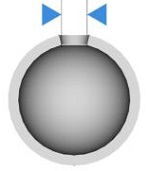
Our online hollowing optimization tool has the ability to greatly reduce the price and the weight of a print by reducing the amount of material used. Using the tool requires adding two holes to your model, which will serve as the drain for the excess powder material within the object. The minimum size of these holes is determined by our website. Otherwise, it is possible to hollow your object manually in your 3D modeling software. |
Value (Dry) | Value (Cond) | Method | |
Tensile Strength | 65 MPa (X) / 55 MPa (Z) | 55 MPa (X) / 47 MPa (Z) | ISO 527-2 (23°C) |
Tensile Modulus | 3150 MPa (X) / 2150 MPa (Z) | 2300 MPa (X) / 1550 MPa (Z) | ISO 527-2 (23°C) |
Elongation at Break | 20% (X) / 23% (Z) | 22% (X) / 31% (Z) | ISO 527-2 (23°C) |
Tensile Strength | 38 MPa (X) / 30 MPa (Z) | 34 MPa (X) / 27 MPa (Z) | ISO 527-2 (80°C) |
Tensile Modulus | 900 MPa (X) / 550 MPa (Z) | 800 MPa (X) / 500 MPa (Z) | ISO 527-2 (80°C) |
Elongation at Break | 37% (X) / 49% (Z) | 35% (X) / 47% (Z) | ISO 527-2 (80°C) |
Charpy Impact unnotched | 6.6 kJ/m² (X) / 4.7 kJ/m² (Z) | 7.3 kJ/m² (X) / 5.3 kJ/m² (Z) | ISO 179-1 |
HDT B (0.45 MPa, dry) | 186°C | 186°C | ISO 75-2 |
- Data sheet
- Data sheet from the manufacturer – Values are not guaranteed – Please contact us if you’d like to know more about the properties we have tested.
Ready to 3D print with Ultrasint® PA11 ESD
With Sculpteo’s online 3D printing service you’re just a few clicks away from professional Ultrasint® PA11 ESD 3D printing. Your 3D model is printed with the highest quality and delivered straight to your door.
Get started now!


 Connect with Google
Connect with Google Connect with Facebook
Connect with Facebook